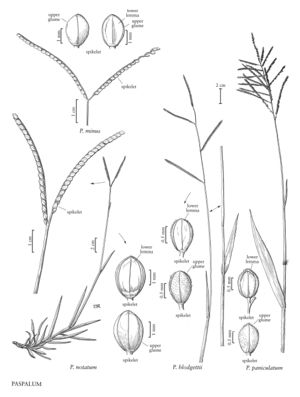Difference between revisions of "Paspalum paniculatum"
FNA>Volume Importer |
imported>Volume Importer |
||
| Line 4: | Line 4: | ||
|publications= | |publications= | ||
|common_names=Arrocillo | |common_names=Arrocillo | ||
| + | |special_status={{Treatment/ID/Special_status | ||
| + | |code=I | ||
| + | |label=Introduced | ||
| + | }} | ||
|basionyms= | |basionyms= | ||
|synonyms= | |synonyms= | ||
| Line 38: | Line 42: | ||
|publication title= | |publication title= | ||
|publication year= | |publication year= | ||
| − | |special status= | + | |special status=Introduced |
| − | |source xml=https:// | + | |source xml=https://bibilujan@bitbucket.org/aafc-mbb/fna-data-curation.git/src/bb6b7e3a7de7d3b7888a1ad48c7fd8f5c722d8d6/coarse_grained_fna_xml/V25/V25_1454.xml |
|subfamily=Poaceae subfam. Panicoideae | |subfamily=Poaceae subfam. Panicoideae | ||
|tribe=Poaceae tribe Paniceae | |tribe=Poaceae tribe Paniceae | ||
Revision as of 22:01, 27 May 2020
Plants perennial; cespitose or rhizomatous. Culms to 100 cm, erect; nodes pubescent. Sheaths pubescent; ligules 0.2-0.5 mm; blades 12-35 cm long, 10-24 mm wide, flat, scabrous, pubescent near the margins, margins usually undulate. Panicles terminal, with 18-50 racemosely arranged branches; branches 0.8-8.9 cm, spreading to diverging, often arcuate; branch axes 0.2-0.5 mm wide, narrowly winged, scabrous, terminating in a spikelet. Spikelets 1.1-1.3 mm long, 0.9-1 mm wide, paired, diverging from the branch axes, ovate, light brown to stramineous. Lower glumes absent; upper glumes and lower lemmas pubescent, 3-veined; upper florets 1.1-1.3 mm, stramineous. Caryopses 0.7-0.8 mm, light brown. 2n = 20, 40, 60.
Distribution
Puerto Rico, Virgin Islands, Pacific Islands (Hawaii), Miss.
Discussion
Paspalum paniculatum is native from Mexico and the West Indies to Argentina. It is now established in Mississippi and southern Florida, growing in disturbed areas.
Selected References
None.
